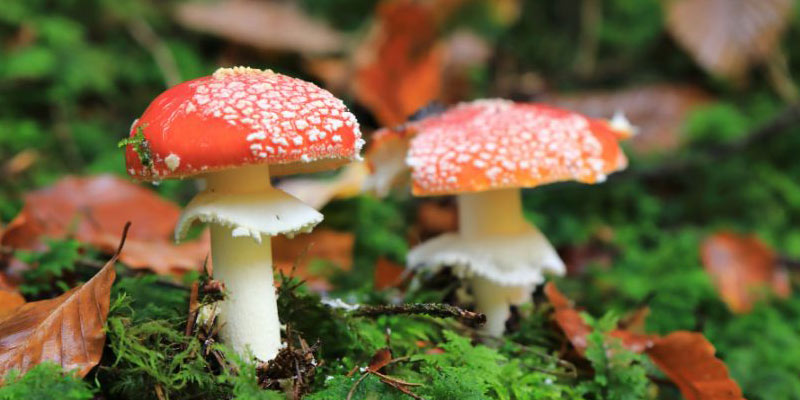Decomposition: Fungi and Friends

Decomposers play a crucial role in our ecosystems as the cleanup crew. These organisms break down dead matter to make nutrients available for plants to use. Decomposers feed on dead plant material like leaf litter and wood, animal carcasses, and scat. Without these organisms, there would be a buildup of dead materials in natural areas, cities, and suburbs alike.
Types of Decomposers
Worms are the most common decomposer. They move through the soil by taking in the soil in front of them and passing it through their body. They physically breakdown organic matter through their digestive systems to create rich, nutrient-filled soil (also known as castings). Another popular decomposer is mushrooms. These “fun-guys” release chemicals, to decompose plant and animal matter which is then absorbed by the mushroom as nutrients. The third decomposer often goes unnoticed because they cannot be seen with our own eyes. They are called microbes! These microscopic organisms, like bacteria, are chemical decomposers. One tablespoon of healthy soil contains billions of microorganisms making them the largest and most efficient group of decomposers. Other decomposers include millipedes, centipedes, slugs, and isopods.
Decomposition
Decomposition is the breakdown of dead organic material. All naturally decaying objects are broken into simpler forms like carbon, oxygen, nitrogen, or phosphorus. Once material has decomposed to this level, plants can absorb and recycle these nutrients. This process restarts the food chains of our ecosystems and helps keep the soil healthy.
Many different factors impact the speed of decomposition. Some examples include temperature, moisture, number of decomposers present, and amount of sun and shade. The best conditions for fast decomposition include a humid environment, hot temperatures, and moisture.
Composting
Composting turns organic waste into rich soil that is great for gardening. Compost, the mixture of decayed or decaying organic matter that decomposers feed on, is made up of three ingredients: browns, greens, and water. Examples of browns are dead leaves and twigs, while greens are fruit scraps and grass clippings. Composting is an efficient way to recycle our organic waste, conserve landfill space, and easily improve our soil health. Take time today to make a list of things that you can compost in your house and talk with your adults to see if you can start composting in your home.
Activity: Decomposition Experiment
Materials: Two pieces of the same produce, plastic bags (optional), soil (optional)
Try a decomposition right at home! For a simple experiment, observe what happens as the same piece of produce breaks down in different temperatures.
Gather your supplies and place one fruit/vegetable in the refrigerator and one in a hotter place like outside or in a sunny window. Make a hypothesis about which fruit will decompose the fastest and why. Over a week or two, observe the difference between the produce by drawing or taking pictures.
Level up! In the above experiment, you are only testing decomposition in different temperatures, so let’s try moisture levels. Cut up a piece of produce and place it in two different Ziploc bags. You will be adding moist soil to one of the bags and dry soil to the other. To dry your soil, you can spread it in a baking pan and place it in a warm oven (150° F) for an hour or two. Once your bags are ready, place them outside or on a windowsill for a week or two. Keep the moist soil watered regularly, compare the two pieces of produce at the end of the experiment, and answer these questions. Which moisture level made the produce decompose faster, and why? What changes have happened to the produce: smell, color, etc.?
Nature Exploration
Head out on a nature walk near your home or on the trails at the Garden. Roll over logs, move fallen leaves, and observe decomposers up close.
- What kind of decomposers have you found? Take pictures and try to identify them back at home or using the app Seek or iNaturalist.
- What kinds of objects are you finding decomposers on? How long do you think it will take for the decomposing object to disappear?
- If you buried the object or increased the temperature, do you think it would decompose faster or slower?
- Are there items in your house that you can start composting?
Books and Resources
Compost: A Family Guide to Making Soil from Scraps by Ben Raskin
Wonderful Worms by Linda Glaser
DIY Composter
Parts of a Mushroom
Parts of a Worm
